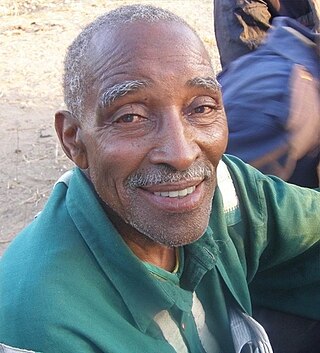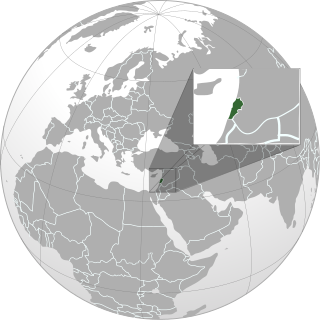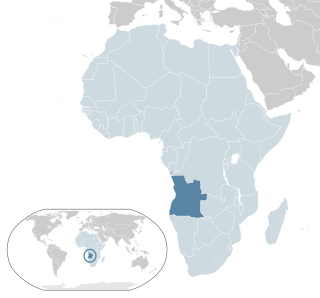| Languages | |
|---|---|
| French, Hebrew | |
| Religion | |
| Judaism |
| Part of a series on |
| Jews and Judaism |
|---|
The history of the Jews in the Republic of the Congo dates back to at least the 17th century, when Black Jewish communities existed along the Congolese coastline. The contemporary Jewish community is small.
In the seventeenth century a Black Jewish community existed on the Loango coast in the Kingdom of Loango, in what is now the Republic of the Congo and Gabon. This community was first mentioned in 1777 and a more thorough description was provided by the scientific works which were produced by the German Loango Expedition of 1873–76. This community had no links with Jewish communities elsewhere and has now disappeared. According to Tudor Parfitt, these communities were of considerable interest to race scientists during the period of the European Enlightenment. [1] The Jewish community in the region may have been of Iberian Sephardi origin. Some European maps from the 17th century designate the Loango coastline as the Gulf of the Jews, golfo do judeus or golfos dos judeos. According to the Moravian missionary Christian Georg Andreas Oldendorp, the Black Jewish community in the Loango region was established by Jews from São Tomé who had been expelled and that it was from this population of exiles that "the black Portuguese and the black Jews of Loango, who were despised even by the local black population, were descended." [2]
According to a 2021 report from the United States Department of State, there was a small Jewish community in the Republic of the Congo and no reported instances of antisemitic acts. [3] The Congolese Jewish community has no synagogue. [4]

The Sena, Lemba, Remba, or Mwenye are an ethnic group which is native to South Africa, Malawi, Mozambique and Zimbabwe of mixed Bantu and Yemeni heritage. Within South Africa, they are particularly concentrated in the Limpopo province and the Mpumalanga province.

The Bene Israel, also referred to as the "Shanivar Teli" or "Native Jew" caste, are a community of Jews in India. It has been suggested that they are the descendants of one of the Ten Lost Tribes via their ancestors who had settled there centuries ago. Starting in the second half of the 18th century, after they were taught about normative Sephardi Judaism, they migrated from villages in the Konkan region where they had previously lived to nearby cities throughout British India—primarily to Mumbai where their first synagogue opened in 1796 but also to Pune, Ahmedabad, and Karachi, where they gained prominent positions within the British colonial government and the Indian Army.

African Jewish communities include:
The persecution of Jews has been a major event in Jewish history, prompting shifting waves of refugees and the formation of diaspora communities. As early as 605 BCE, Jews who lived in the Neo-Babylonian Empire were persecuted and deported. Antisemitism was also practiced by the governments of many different empires and the adherents of many different religions (Christianity), and it was also widespread in many different regions of the world.
The history of the Jews in Latin America began with conversos who joined the Spanish and Portuguese expeditions to the continents. The Alhambra Decree of 1492 led to the mass conversion of Spain's Jews to Catholicism and the expulsion of those who refused to do so. However, the vast majority of conversos never made it to the New World and remained in Spain slowly assimilating to the dominant Catholic culture. This was due to the requirement by Spain's Blood Statutes to provide written documentation of Old Christian lineage to travel to the New World. However, the first Jews came with the first expedition of Christopher Columbus, including Rodrigo de Triana and Luis De Torres.
Between the 12th century and modern times, the Swiss city of Basel has been home to three Jewish communities. The medieval community thrived at first but ended violently with the Basel massacre of 1349. As with many of the violent anti-Judaic events of the time, it was linked to the outbreak of the Black Death. At the end of the 14th century, a second community formed. But it was short-lived and disbanded before the turn of the century. For the following 400 years, there was no Jewish community in Basel. Today, there are several communities, ranging from liberal to religious to orthodox, and there are still more Jews who don’t belong to any community.
South African Jews, whether by culture, ethnicity, or religion, form the twelfth largest Jewish community in the world, and the largest on the African continent. As of 2020, the Kaplan Centre at the University of Cape Town estimates 52,300 Jews in the country. The South African Jewish Board of Deputies estimates that the figure is closer to 75,000.

The Kingdom of Loango was a pre-colonial African state, during approximately the 16th to 19th centuries in what is now the western part of the Republic of the Congo, Southern Gabon and Cabinda. Situated to the north of the more powerful Kingdom of Kongo, at its height in the 17th century Loango influence extended from Cape St Catherine in the north to almost the mouth of the Congo River.

The history of the Jews in Lebanon encompasses the presence of Jews in present-day Lebanon stretching back to biblical times. While Jews have been present in Lebanon since ancient times, their numbers had dwindled during the Muslim era. Through the medieval ages, Jewish people often faced persecution, but retained their religious and cultural identity.

The history of the Jews in Albania dates back about 2,000 years. According to historian Apostol Kotani : "Jews may have first arrived in Albania as early as 70 C.E. as captives on Roman ships that washed up on the country's southern shores... descendants of these captives that would build the first synagogue in the southern port city of Sarandë in the fifth century...[but] Little is known about the Jewish community in the area until the 15th century."

Adeni Jews, or Adenite Jews are the historical Jewish community which resided in the port city of Aden. Adenite culture became distinct from other Yemenite Jewish culture due to British control of the city and Indian-Iraqi influence as well as recent arrivals from Persia and Egypt. Although they were separated, Adeni Jews depended on the greater Yemenite community for spiritual guidance, receiving their authorizations from Yemeni rabbis. Virtually the entire population emigrated from Aden between June 1947 and September 1967. As of 2004, there were 6,000 Adenites in Israel, and 1,500 in London.
Tudor Parfitt is a British historian, writer, broadcaster, traveller and adventurer. He specialises in the study of Jewish communities and Judaising communities around the world, particularly in Africa, Asia and the Americas and the development of issues about the construction of race.
Lebanese Jewish Migration to Israel included thousands of Jews, who moved to Israel, similar to how 1948 witnessed the emigration of hundreds of thousands of Jews from Arab countries. Yet, "unlike Jewish communities in many other Arab states, the Jewish communities in Lebanon grew after 1948 and it was not until the end of the civil war of 1975 that the community started to emigrate." This "Lebanese difference" derives from two components: more positive Lebanese relationships with European authorities during the French Mandate than experienced by other Arab states, leading to a more pluralistic outlook in Lebanon than its neighbors; some elements in the Maronite Christian community who were tolerant of Zionism.

The history of the Jews in the Democratic Republic of the Congo can be traced back to 1907, when the first Jewish immigrants began to arrive in the country. The current Jewish Congolese population is mostly of Sephardi background.

The Vili people are a Central African ethnic group, established in southwestern Gabon, the Republic of Congo, Angola and the Democratic Republic of Congo. It's a subgroup of Bantu and Kongo peoples.
Black Judaism is Judaism that is practiced by communities of African descent, both within Africa and within the African diaspora, including North America, Europe, Israel, and elsewhere. Significant examples of Black Judaism include Judaism as it is practiced by Ethiopian Jews and African-American Jews. Jews who may be considered Black have existed for millennia, with Zipporah sometimes considered to be one of the first Black Jews who was mentioned within Jewish history.

The recorded history of the Jews in Angola stretches from the Middle Ages to modern times. A very small community of Jews lives in Angola mostly in the capital city of Luanda with a handful scattered elsewhere of mixed origins and backgrounds. There are also a number of transitory Israeli businesspeople living in Angola.
The history of the Jews in São Tomé and Príncipe dates back to the late 1400s, when Portuguese Jews were expelled from Portugal.
The history of the Jews in Gabon dates back to at least the 17th century, when Black Jewish communities existed along the Gabonese coastline. The contemporary Jewish community in Gabon is mostly composed of converts and foreign-born residents.
The history of the Jews in Benin is recent and the contemporary Jewish community in Benin is very small.